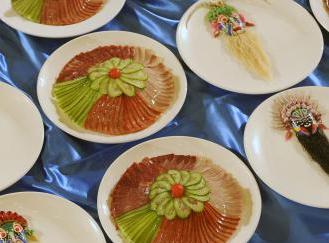| 
A famous ancient Chinese proverb: "To the country, people are the foundation; to the people, food is heaven."
For anyone who has lived in China for a sustained period of time they will know that this proverb is true, so very true. A nation renowned for its healthy diets and slim figures, Chinese people adore their food and distinguish themselves from other regions through their culinary specialties.
After recently watching a Chinese documentary TV series called A Bite of China (舌尖上的中国), I've been paying closer attention to the food I eat: region, cooking methods, presentation, spices and so on. There really is so much more to Chinese cuisine than what first meets the eye.
Eight culinary traditions of China by region:
Guangdong Cuisine (Cantonese Food/Yue Cuisine): sweeter, favouring braising and stewing, adding various sauces.
Sichuan Cuisine (Chuan Cuisine): spicy and bold, using lots of chili, garlic, ginger and peanuts.
Shandong Cuisine (Lu Cuisine): salty and crispy, favouring braising and seafood.
Fujian Cuisine (Min Cuisine): lighter, with a sweet and sour taste, using ingredients from the sea and the mountains.
Jiangsu Cuisine (Su Cuisine): fresh, salty and sweet, favoring soups and precise cooking techniques.
Hunan Cuisine (Xiang Cuisine): quite spicy, favors sautéing, stir-frying, steaming and smoking.
Anhui Cuisine (Hui Cuisine): uses many wild plants and animals as ingredients, favoring stewing and more oil.
Zhejiang Cuisine (Zhe Cuisine): mellow, uses freshwater fish, seafood and bamboo shoots, and a wide variety of cooking methods.
To really appreciate these dishes you need to get yourself out to the specific regions and embroil yourself in the whole culinary occasion. There are many wonderful restaurants spread throughout China and it's easy to stumble upon a Sichuan restaurant in the heart of Beijing. However, the most adamant of food lovers will assure you that the best place to eat Sichuan cuisine is in Sichuan - it seems obvious, I know.
The recipes and traditions of Chinese food stretch back thousands of years, with the same ingredients and cooking processes still being used today.
Meal-time in China is the most important time of the day. In the West we greet each other with a simple "how are you?", whereas in China the traditional greeting is "have you eaten?" - this further emphasizes the importance of food and why lunch/dinner time is so vital in day-to-day life. Gatherings of family, friends or colleagues often happen at the dining table and business deals are often chewed over around circular tables lavished with mountain-high dishes of local delicacies.
Hosts are always encouraging their guests to eat as much food as possible and it's a show of respect to the host to duly oblige. There are many ways to show respect in China and at the dinner table can be a great place to practice. Examples such as clinking your glass lower when saying "cheers" can be seen as showing respect to seniority at the table and keeping your neighbor topped up with beer or tea.
When attending restaurants in different provinces, it's always a wise idea to snuff out a famous local dig and ask what their speciality is - chances are it's going to be authentic and memorable - for good or for bad. I used to live in a city called Shaoxing in Zhejiang Province, which was home to chòu dòufu (stinky tofu) and that certainly left me with some memories - for the worse. A more pleasurable experience was in the garden city of Suzhou, Jiangsu Province, where I indulged in the famous sweet and sour fish - I, to this day, am determined to go back, as nowhere else I've been does that dish to the same exceptional quality.
I've recently started preparing an eating list subcategorized by regions of Chinese food. I'm going to leave the Sichuan cuisine until last as that's the spiciest and my pallet isn't ready yet. After three years in a country where food is heaven, it really is about time I become more adventurous with my food. |